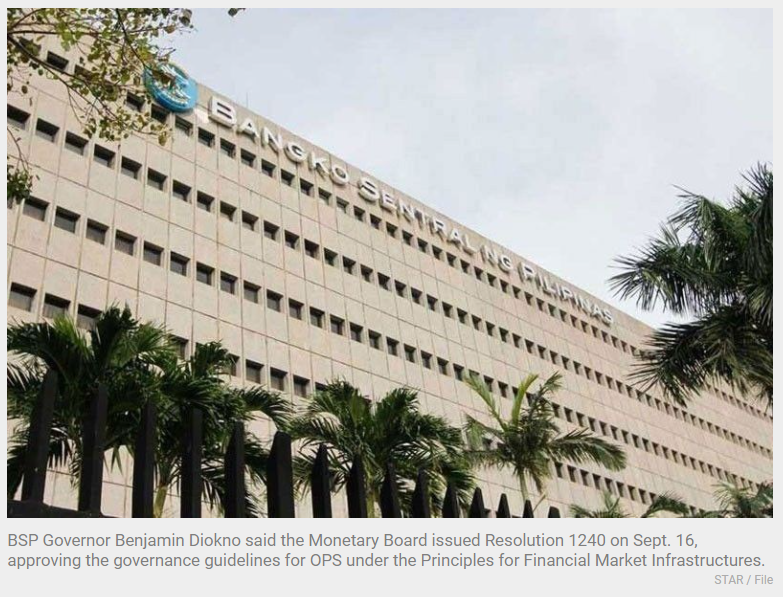Philippines: BSP imposes strict rules for payment system operators
MANILA, Philippines — The Bangko Sentral ng Pilipinas (BSP) has imposed stricter governance standards for operators of payment system (OPS), which play a vital role in sustaining the safe and efficient flow of payments in the country, including those arising from critical financial market transactions.
BSP Governor Benjamin Diokno said the Monetary Board issued Resolution 1240 on Sept. 16, approving the governance guidelines for OPS under the Principles for Financial Market Infrastructures (PFMI).
The framework is the internationally recognized standards jointly issued by the Bank for International Settlements and the International Organization for Securities Commissions.
Diokno has issued a circular stating that the guidelines cover all registered OPS, including the BSP as the operator of the real time gross settlement (RTGS) system, BSP-supervised financial institutions (BSFIs) including banks and non-bank financial institutions such as electronic money issuers, cooperatives regulated by the Cooperative Development Authority (CDA), branches and subsidiaries of foreign incorporated entities, as well as domestic corporations.
“Being generally responsible for interlinking these institutions that execute payment orders in their normal course of business, the OPS are also crucial in maintaining the public’s confidence in the financial system,” Diokno said.
According to the BSP, the issuance of the governance policy for OPS is part of the phased-in implementation of Republic Act 11127 or the National Payment Systems Act (NPSA).
It provides the regulatory expectations on the governance arrangements and standards to be adhered to by all OPS, as well as the criteria for qualification and grounds for disqualifications of individuals elected or appointed as directors or officers of an OPS.
In particular, the rules prohibit concurrent directorships among a clearing switch operator (CSO), its critical service provider and the payment system management body that governs the automated clearing house for which such CSO renders clearing services.
The guidelines also set governance standards that prescribe the quality of stewardship among OPS given that these entities have critical roles in ensuring the smooth circulation of funds in the economy in a safe, efficient, affordable and convenient manner.
While the policy seeks to address governance concerns that are particularly applicable to entities conducting business as OPS, the principles espoused under the policy issuance are broadly aligned with the governance standards applicable to BSFIs and the provisions of relevant domestic laws and regulations.
Meanwhile, OPS that have concurrent authorities, such as a bank or an electronic money issuer, shall abide by the more rigid requirements prescribed by virtue of such concurrent authorities.
Consistent with the BSP’s proportional and risk-based approach to payment system oversight, more stringent requirements shall apply to operators of designated payment systems (ODPS) in view of the potential of designated payment systems to pose systemic risks to the financial system.
Moreover, a failure in such designated payment systems could undermine public confidence in the national payment system.
Source: https://www.philstar.com/business/2021/09/22/2128719/bsp-imposes-strict-rules-payment-system-operators


 English
English




